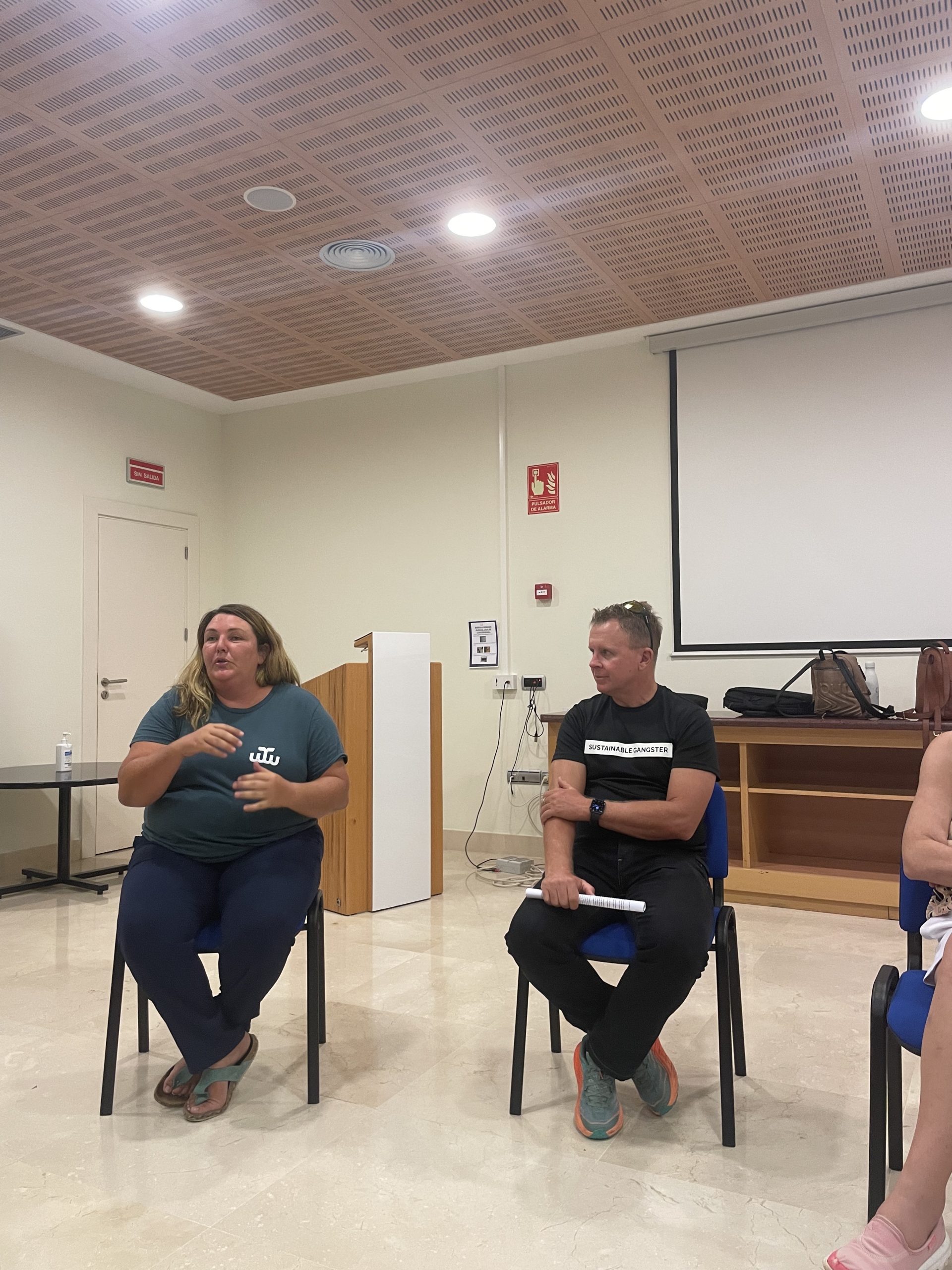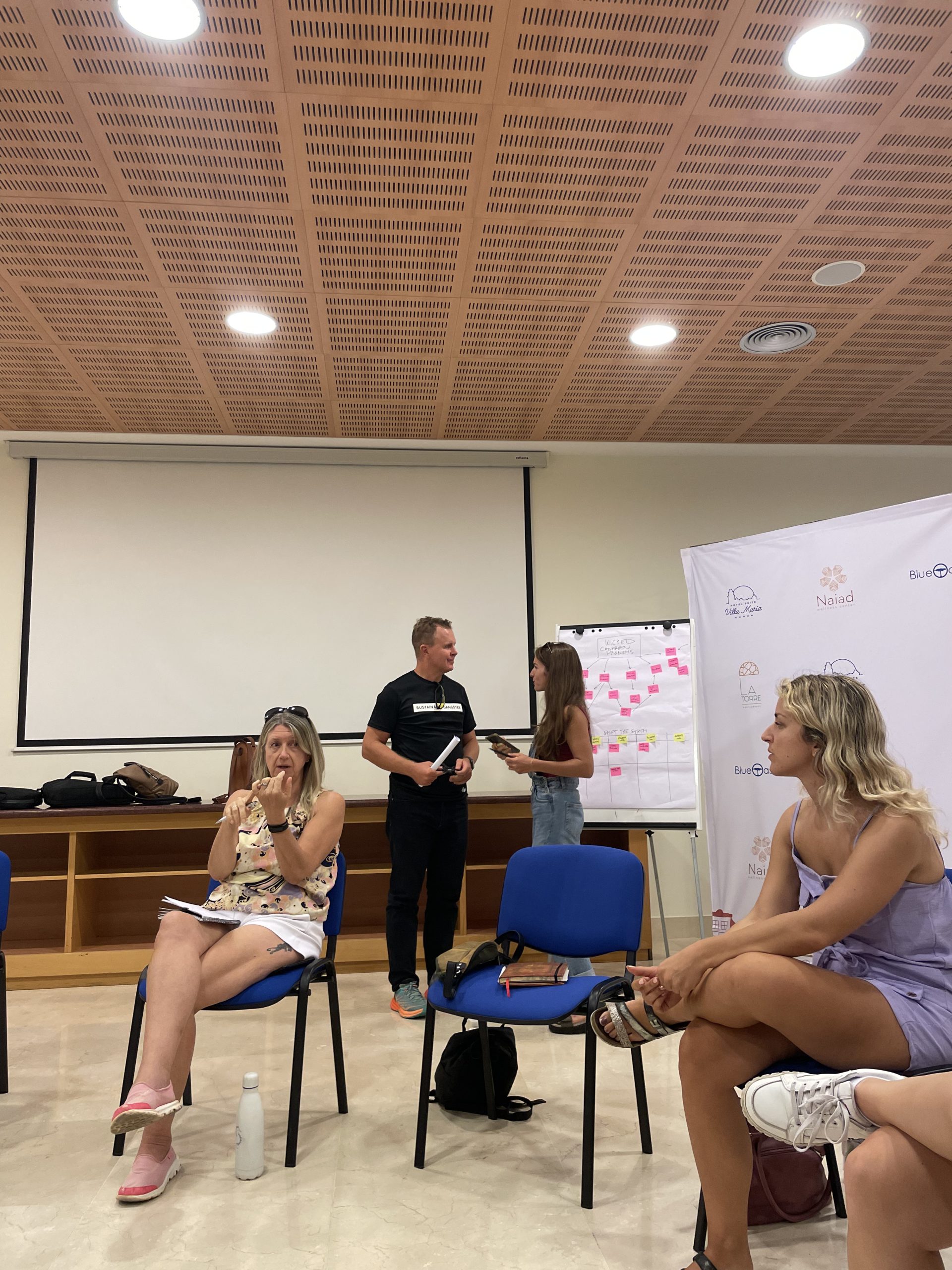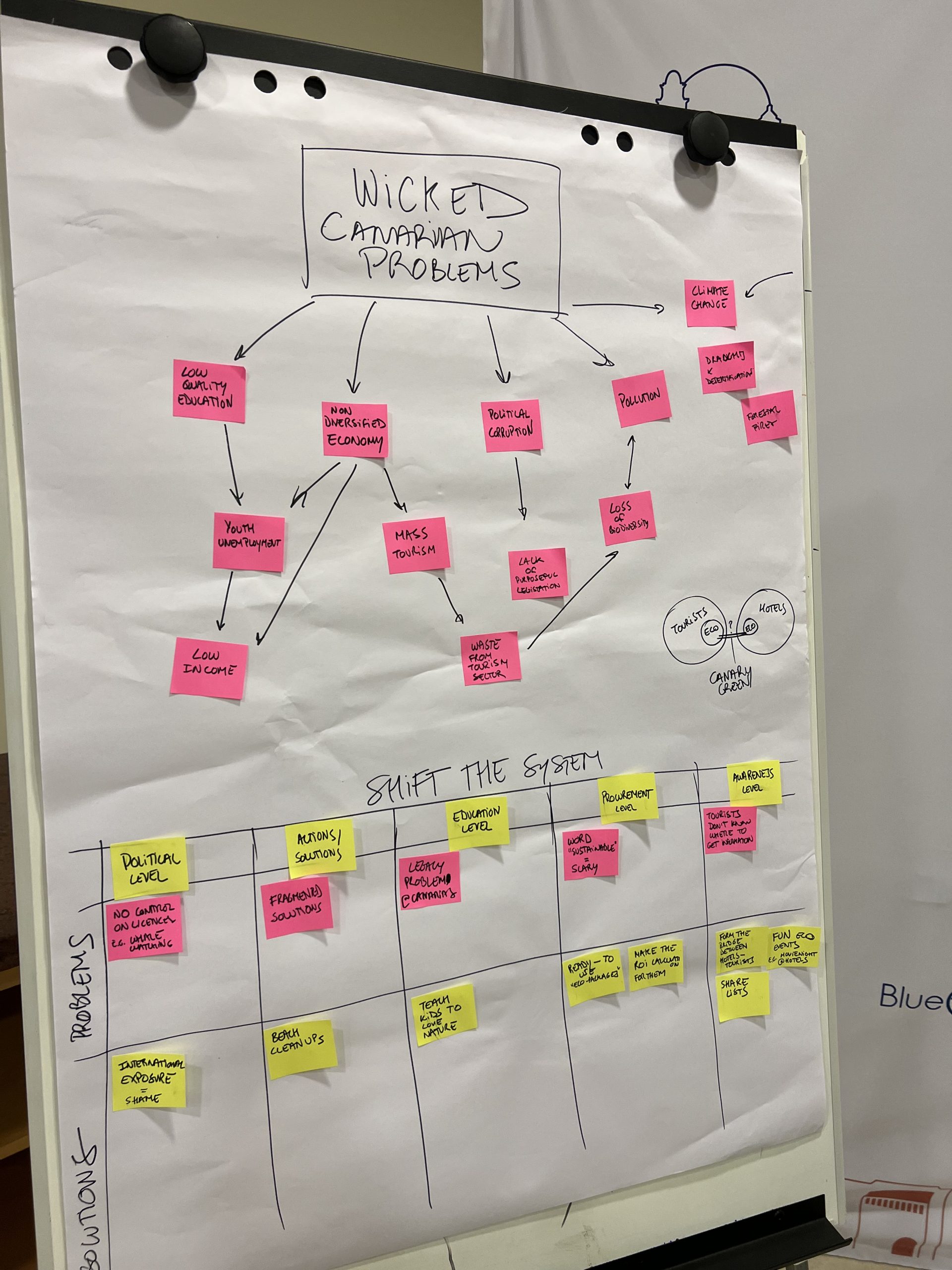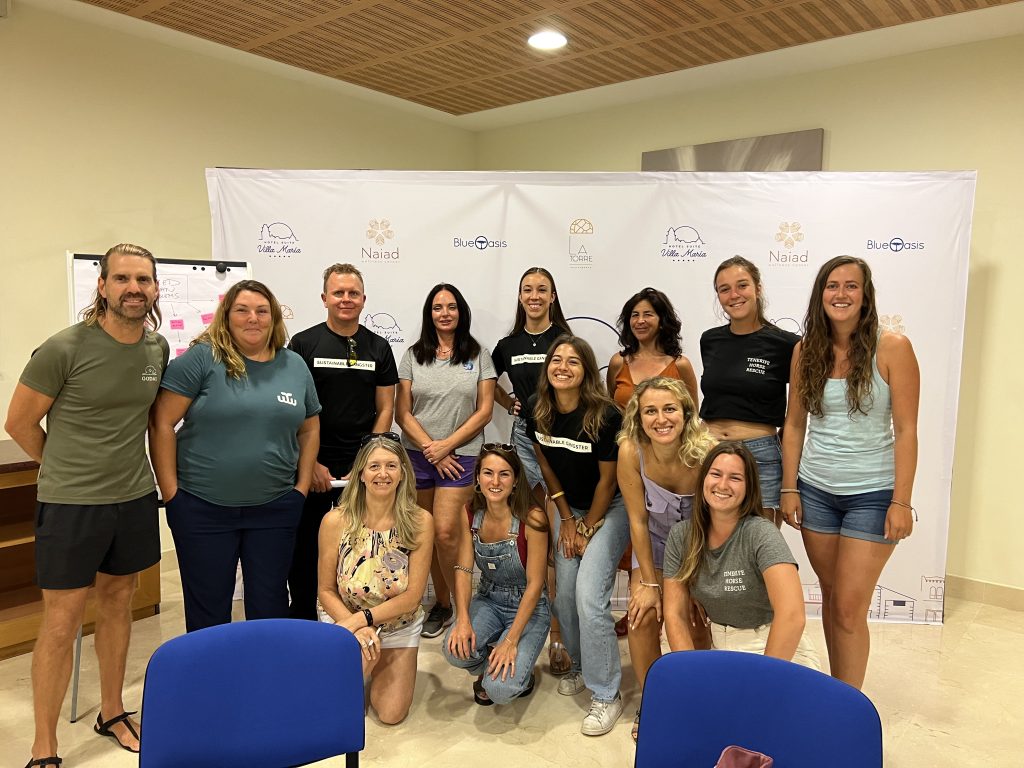On Thursday, 28th of September, we held the first brainstorming session for our upcoming Ocean Clean Up Project that we want to focus on next year. We were very excited to start this project and were more than happy to see interested participants from different fields of profession and interest. Special thanks to our three main speakers: Mercedes Reyes from We Whale, Jo Hendrickx from Travel without Plastic, and our very own John Dale Beckley from Canary Green.
Ocean Clean Up Project Outline
During our session, we talked about various topics that all relate to our beautiful ocean and how we can protect it. We propose the following main steps to be taken in the context of this project:
- Assessment and Research: Conduct a thorough assessment of the current state of marine pollution in the Canary Islands. Identify the most affected areas, types of pollution (e.g., plastic waste, oil spills, marine debris), and their sources.
- Collaborative Partnerships: Collaborate with local government agencies, non-profit organizations, environmental experts, and local businesses to form a coalition committed to ocean conservation.
- Prevention:
- Waste Reduction Programs: Promote waste reduction campaigns targeting single-use plastics and non-recyclable materials. Encourage businesses to adopt eco-friendly practices.
- Fishing Gear Regulations: Advocate for sustainable fishing practices and regulations, including the retrieval of lost or abandoned fishing gear.
- Port and Industry Engagement: Engage with ports and industries to implement responsible waste disposal practices and minimize chemical runoff into the sea.
- Regular Pollution Inspections: Establish a system for regular inspections of potential pollution sources, such as ships and offshore oil platforms.
- Education and Outreach:
- School Programs: Develop marine conservation curricula for schools and organize educational workshops to raise awareness among students.
- Community Workshops: Conduct workshops, seminars, and public awareness campaigns for residents and tourists about the importance of marine conservation.
- Tourism Industry Engagement: Collaborate with the tourism industry to educate tourists on responsible marine activities, including snorkeling and diving.
- Protection of Marine Life:
- Marine Reserves: Advocate for the establishment and expansion of marine protected areas (MPAs) to safeguard critical habitats and vulnerable species.
- Monitoring and Research: Support ongoing research on marine ecosystems and species, using technology like underwater drones and satellite tracking to monitor marine life.
- Working only with officially organized boats
- Cleanup Initiatives:
- Regular Beach Cleanups: Organize regular beach cleanup events involving volunteers, local communities, and schools.
- Underwater Cleanups: Train divers to conduct underwater cleanups in popular diving spots.
- Floating Debris Collection: Deploy floating debris collection systems in high-pollution areas.
- Engaging with Tourists to be involved with cleanups.
- Legislation and Policy Advocacy:
- Advocate for stricter environmental regulations and penalties for marine pollution offenders.
- Promote international cooperation to address issues such as illegal fishing and transboundary pollution. For some topics, collecting signatures with petitions could be a step to get the governments to listen.
- Monitoring and Reporting: Implement a system for monitoring the progress of cleanup and conservation efforts, and regularly publish reports to keep the public informed.
- Sustainable Practices:
- Encourage sustainable tourism and fishing practices that prioritize the long-term health of marine ecosystems.
- Promote legitimate boat companies: Whale Wise Eco Tours gives us a best practice example for responsible whale watching tours with their multi-award-winning tours.
- Funding and Resources: Seek funding from government grants, private donors, and international organizations to support your initiatives.
- Evaluation and Adaptation:
- Continuously assess the effectiveness of these strategies and adapt them based on the evolving needs and challenges of ocean conservation in the Canary Islands.
- Effective ocean conservation requires ongoing commitment and cooperation from various stakeholders: Regularly engage with the community, monitor your progress, and adjust your strategies as needed to achieve your goals.
Impacts of sunscreen and everyday cleaning products
Two topics concerning the pollution of the ocean were at the center of discussion:
Effects and Impact of Sunscreen on the Ocean: Sunscreen can have detrimental effects on the ocean when people swim or engage in water activities. The key impacts include:
- Coral Bleaching: Certain chemicals in sunscreen, such as oxybenzone and octinoxate, can contribute to coral bleaching. This disrupts the symbiotic relationship between corals and algae, leading to coral death.
- Toxicity to Marine Life: Sunscreen chemicals can be toxic to various marine organisms. They can harm fish, sea urchins, and other aquatic life, affecting their reproductive and growth capabilities.
- Bioaccumulation: Sunscreen chemicals can accumulate in the tissues of marine animals, potentially making their way up the food chain, posing risks to larger predators, including humans.
Effects and Impact of Everyday Hotel Cleaning Products on the Ocean: Hotel cleaning products, when disposed of improperly, can also have adverse effects on the ocean:
- Chemical Runoff: Cleaning products often contain chemicals like bleach, ammonia, and phosphates. When wastewater containing these chemicals is not properly treated, it can flow into waterways and ultimately reach the ocean.
- Water Pollution: These chemicals can contribute to water pollution in coastal areas, harming aquatic ecosystems and disrupting the balance of marine life.
- Harm to Marine Life.
What can we change?
After discussing various topics revolving around the protection of our ocean in connection with our ocean cleanup project, we want to give an overview of particular actions that we can take, although this is just a start.
What tourists can do:
- Choose Reef-Friendly Sunscreen: Look for sunscreens labeled as “reef-friendly” or “ocean-safe.” These products typically do not contain harmful chemicals like oxybenzone and octinoxate. Use sunscreen sparingly and apply it at least 30 minutes before entering the water to minimize runoff.
- Limit Sunscreen Use: Consider wearing protective clothing like rash guards and hats to reduce the amount of sunscreen needed. Reserve sunscreen for areas that are not covered by clothing.
- Dispose of Waste Properly: Avoid littering beaches or coastal areas with sunscreen bottles and other trash. Use designated trash bins and recycling facilities.
- Support Responsible Tourism: Choose accommodations and tour operators that follow sustainable and eco-friendly practices. Research and select businesses that prioritize environmental conservation.
- Reduce Plastic Usage: Minimize the use of single-use plastic items like straws, bottles, and bags. Plastic waste can harm marine life when it enters the ocean.
What hotels can do:
- Provide Reef-Friendly Products: Hotels and resorts can offer guests reef-friendly sunscreen and toiletries in their rooms or for sale in their gift shops.
- Implement Eco-Friendly Cleaning Practices: Adopt environmentally friendly cleaning products and practices that reduce chemical runoff and pollution. Ensure that wastewater is properly treated before being released.
- Educate Guests: Promote awareness among guests about the importance of protecting the environment and provide information on responsible sunscreen use and waste disposal. Show videos in the lobby, in-room on TV, etc.
- Support Conservation Efforts: Collaborate with local environmental organizations and participate in conservation initiatives such as beach clean-ups and coral reef restoration projects.
- Reduce Single-Use Plastics: Phase out single-use plastic items like disposable water bottles and straws, and instead offer reusable and sustainable alternatives. Implement an exchange system for air rings and air mattresses used in the pool and at the beach to reduce plastic waste.
- Adopt Sustainable Landscaping: Use native and drought-resistant plants in landscaping to reduce the need for excessive watering and chemical maintenance.
- Monitor and Report: Continuously monitor the impact of hotel operations on the environment and report on progress toward sustainability goals.




Future plans and initiatives
As this was only the first brainstorming session, we still have a lot of ideas that need more discussion and research, such as:
- The possibility of including hotel staff in beach cleanups, for example, for special occasions like World Environment Day. If we were accepted by TravelLife as a training organization, the cleanup could count as training for the hotel staff. We would do the cleanups at different hours so that different staff can participate.
- Looking into a whale heritage site certificate for whale-watching boats: The boats would have to have the certificate to be authorized to do the tour. Moreover, it is important for us to promote responsible whale-watching tours and have hotels promote them as well. In order to achieve this, we would need pressure from the government in the form of fines given out for irresponsible habits while whale watching to the whale-watching companies. We want to have a list of all responsible boats and publish it everywhere, and encourage the hotels to do so as well.
- We need to reach people before they go on holiday: The customer journey shows that tourists research before they go on holiday. Therefore, effective online communication becomes essential. .


Thank you!
At this point, we want to say thank you to everybody who participated in this event. We discussed some very important points and are excited to get the project starting.
connect with
Thank you
Thank you to everyone involved in this Canary Green project where our aim is to help promote sustainable tourism in the Canary Islands.
Do you want us to find you more sustainable choices? Please support us and donate today.
- John Beckley; Founder of Canary Green non profit
- Jo Hendricks from Travel Without Plastic
- Mercedes Reyes from Whale Wise Eco Tours
- Ornella Torres Melkebeek
- Danielle from Ocean Angel
- Tenerife Horse Rescue
- Vagabonds Coliving
- Anna; Digital marketing for sustainabilty
- Jette Beyer; Sustainable Hotels and Tourism Development Manager
- Hotel Suite Villa Maria; our host for this event
- Our amazing Sponsors: Adeje Verde


What an interesting and inspiring discussion, I am looking forward to seeing what this project will achieve in the future!
This was by far the most inspiring discussion I attended in a long time, I really enjoyed so many different sectors coming together and discussing what we all can change – I loved it!